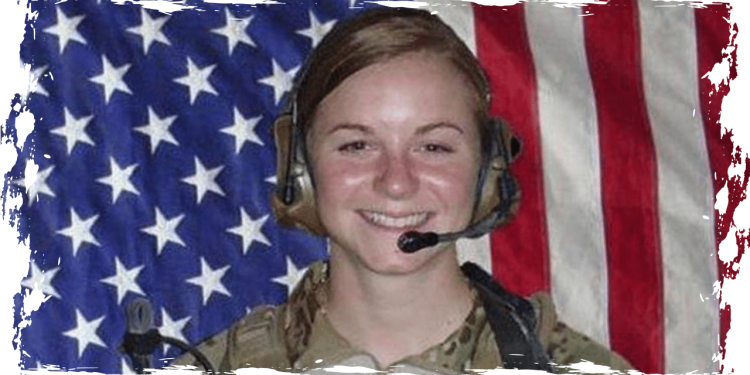Ashley White was presented with the prestigious Combat Action Badge by the United States Army shortly after her deployment to Afghanistan as a first lieutenant. This silver military award is given to soldiers who have personally faced enemy engagement during combat. For White, receiving this badge was not only a significant achievement but also a validating milestone as a newly deployed soldier. She had earned the badge by using her own body to shield a group of civilian women and children from gunfire during her third mission in Kandahar province. Fortunately, all of them survived. Despite her accomplishment, White chose to keep this recognition to herself and did not mention it to anyone in her battalion.
“My daughter, Ashley, possessed a truly remarkable quality – humility,” shared Deborah White, Ashley’s mother, as Memorial Day approached this year. She revealed, “If she were here today, she would be deeply uncomfortable with the overwhelming praise and recognition she has received since her passing.”
Ashley White, a 24-year-old soldier, tragically lost her life on October 22, 2011, during her deployment in Afghanistan. While serving on the Special Operations task force, she was a victim of an accidental explosion caused by a fellow soldier who triggered an improvised explosive device. This devastating incident claimed the lives of Ashley and two other individuals.
In recognition of her courage and dedication, Ashley White was posthumously honored with several prestigious military accolades. Among these commendations were the Bronze Star, the Purple Heart, and the Meritorious Service Medal.
White, a native of northeastern Ohio, defied the odds as she was chosen among the hundreds of applicants to be part of the Special Operations forces deployed in Afghanistan. This was during a time when women soldiers were prohibited from serving in combat roles. While pursuing her studies in sports medicine at Kent State University, White took a bold step and joined the Reserve Officers’ Training Corps program.
“I believe she enjoyed the sense of camaraderie and the close-knit community,” reflected Deborah White. ROTC, a program designed to develop leadership skills in college students for future roles in the Armed Forces, mandated that participants serve in the military after obtaining their degrees. Ashley White embarked on her journey as a Medical Services Corps Officer, dedicating several years of service to the U.S. National Guard in Greensboro, North Carolina.”
In 2011, the military started recruiting women for Cultural Support Teams. These teams played a vital role in bridging the gap between U.S. soldiers and Afghan women, who were often unable to interact with male soldiers due to cultural customs. The primary objective of women on cultural support teams was to facilitate communication and engagement with civilian women and children. An advertisement promoting these positions offered female soldiers the chance to “become part of history” by joining the male-dominated Special Ops. Intrigued by the opportunity, White applied for the program and was successfully admitted. She underwent further training and was deployed in August.
White’s service in Afghanistan is believed to have played a significant role in the military’s decision to lift the ban on women in 2013. This historic moment recognized the valuable contributions women soldiers had been making for years and created new career opportunities that were previously limited to men.
Gayle Tzemach Lemmon, author of the 2015 book “Ashley’s War” which explores White’s story and the women who served alongside her, emphasized during a discussion with the Council of Foreign Relations following the book’s publication that White and her teammates may have played a pivotal role in paving the way for integration. Reflecting on White’s passing, her mother expressed that she had shattered the glass ceiling.
Lemmon’s account of the women who quietly guided a significant part of the war effort, without seeking recognition, placed White at the heart of it all and brought her story to the forefront. “Ashley’s War” achieved great success, becoming a bestseller according to The New York Times.
According to those who were acquainted with her, White’s impressive accomplishments served as a source of inspiration. However, what truly set her apart, as conveyed to Lemmon by those who knew her personally, was her remarkable combination of kindness and resilience.
During a talk in 2015, Lemmon described Ashley as the driving force behind a remarkable team of soldiers who willingly answered the call to serve. He emphasized that Ashley’s actions spoke louder than words, as she never boasted about her capabilities. Her character and dedication were evident in her actions, exemplifying the power of leading by example.
White’s influence can be felt in every corner, as Deborah White aptly stated, “it’s everywhere.”
Only a few women have been recognized for their exceptional acts of bravery, and one of them is commemorated in the National Museum of the U.S. Army in Virginia. Additionally, housing complexes for women veterans in two states proudly bear her name. Moreover, thanks to the foundation established by White’s family, two deserving students from her Marlboro Township high school receive annual scholarships worth $1,500.
People all over the country, both within and outside the military, are celebrating White as a true hero. She is regarded as an outstanding soldier and a pioneer who has broken barriers and opened doors for the next wave of women in the military. They now have more opportunities and fewer obstacles to overcome thanks to her remarkable achievements.
Deborah White attributed her daughter’s remarkable courage, especially at such a young age, to her own upbringing.
“I’m amazed by the drive and determination of all my children. Perhaps we instilled the right values in them,” she remarked. “Honestly, she completely surpassed my expectations.”










